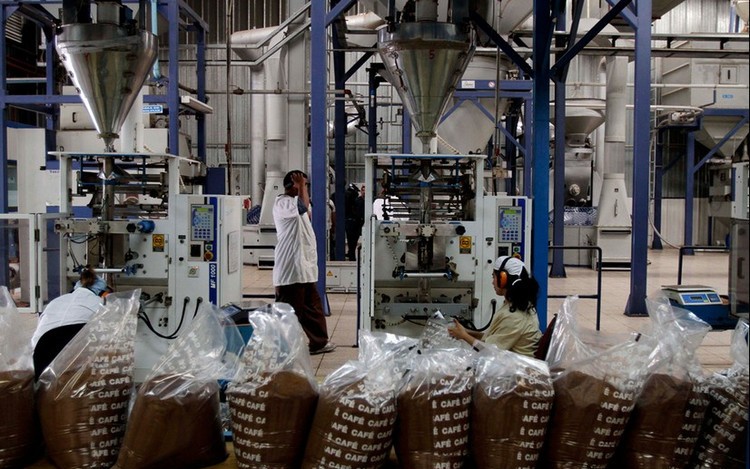
Recently, the global coffee market has experienced an unprecedented storm. Global coffee prices have soared to their highest level in nearly 50 years due to bad weather in Brazil and Vietnam. The change has not only forced roasters such as Nestle to raise prices, but also left consumers struggling to find cheaper coffee alternatives amid a cost-of-living crisis. However, behind this price storm, there are more complex business logic and interest entanglements.
Brazil and Vietnam, as the world's two largest coffee producers, have a pivotal position in the global coffee market. However, in recent years, coffee production in both countries has been frequently hit by natural disasters. Brazil suffered one of the worst droughts on record this year, and although rains finally arrived in April, soil moisture remains low, causing coffee plants to produce too many leaves and not enough flowers, which in turn affects the yield of coffee beans.
The situation in Vietnam is no better. The country produces most of the world's Robusta beans, which are used to make instant coffee, but a severe drought earlier this year was followed by excessive rainfall, which has made coffee production worse. These natural disasters have undoubtedly had a huge impact on global coffee supplies, causing supply to lag behind demand for three years.
However, careful analysis of these so-called "natural disasters", we can easily find that there are also hidden human factors. Coffee-producing countries have long underinvested in agricultural infrastructure, water management and pest control, leaving coffee production systems vulnerable. In the event of extreme weather, it is difficult to respond effectively, which leads to a sharp decline in production.
The soaring price of coffee is a nightmare for roasters and traders alike. For roasters, higher prices mean higher costs, and in order to maintain profit levels, they have to raise their selling prices. However, in the context of the current poor global economic situation, consumers have reduced purchasing power and increased price sensitivity, so roasters are at risk of declining sales and market share losses.
The boss of Nestle, the world's biggest coffee company, was ousted earlier this year after the board was unhappy with the loss of market share caused by weak sales and price rises. The incident speaks volumes about the enormous pressure that soaring coffee prices are putting on roasters.
For traders, the surge in coffee prices has also created unprecedented challenges. Worried that they would not be able to get enough beans from producing countries such as Brazil and Vietnam, many traders began to unwind short futures positions that had become loss-making. The move pushed coffee prices even higher, putting traders under pressure for higher margin calls or down payments.
More seriously, some traders, such as Atlantica and Cafebras, have even sought court-supervised debt restructurings, unable to bear the pressure of soaring prices and delivery delays. If the talks fail, the dealers risk bankruptcy.
Consumers are undoubtedly the most innocent victims of the coffee price storm. As coffee prices soar, many consumers have had to abandon their beloved coffee brands in search of cheaper alternatives. However, in the context of the current poor global economic situation, consumers have significantly reduced their purchasing power and increased their price sensitivity to an unprecedented degree.
For consumers who go out drinking, the rising price of coffee has undoubtedly exacerbated their cost of living crisis. They have to manage their spending more carefully to cope with rising prices. For those who are used to enjoying a cup of coffee in a cafe, they may be able to bear the pressure of rising prices, but this will undoubtedly increase their financial burden.
The storm in coffee prices has exposed the fragility of the global coffee supply chain and market imbalances. On the one hand, coffee-producing countries have underinvested in agricultural infrastructure, water management and pest control, leaving coffee production systems vulnerable. On the other hand, the global coffee market lacks an effective regulatory mechanism, making it difficult to effectively resolve the imbalance between supply and demand.
In addition, roasters and traders lack effective coping strategies in the face of soaring prices. They tend to rely too much on traditional sourcing and sales channels and lack innovation and flexibility. This makes it difficult for them to adjust their strategies quickly in the face of market changes, which in turn increases market volatility and uncertainty.
What is more serious is that some roasters and traders ignore the importance of long-term sustainable development in order to maximize short-term profits. They over-exploit coffee resources and destroy the ecological environment, resulting in a serious threat to the sustainability of the coffee production system. This not only harms the interests of coffee producing countries, but also threatens the stability and sustainable development of the global coffee market.
In the face of the challenges and dilemmas posed by this coffee price storm, we need to find solutions on multiple levels. First, coffee-producing countries need to invest more in agricultural infrastructure, water management and pest control to make coffee production systems more resilient and sustainable. Second, the global coffee market needs to develop more effective regulatory mechanisms to deal with the imbalance between supply and demand. At the same time, roasters and traders also need to strengthen innovation and flexibility to meet the challenges posed by market changes.

Below is the English translation of the text, with precise handling of political terms, consistent sentence structures, and preservation of the original’s analytical tone and logical flow:
Below is the English translation of the text, with precise …
On December 15 local time, Trump took the British Broadcast…
In recent years, the application of artificial intelligence…
According to Yahoo US media reports, the recent remarks of …
After 11 years of waiting in the deep sea, we finally have …
On December 17, 2025, the newly renovated American "Preside…